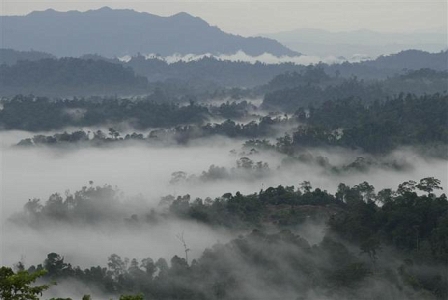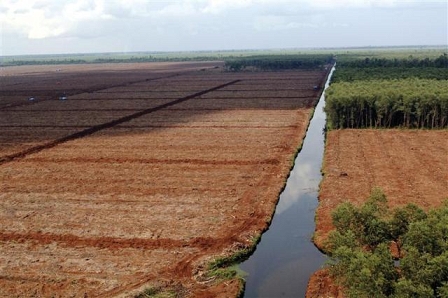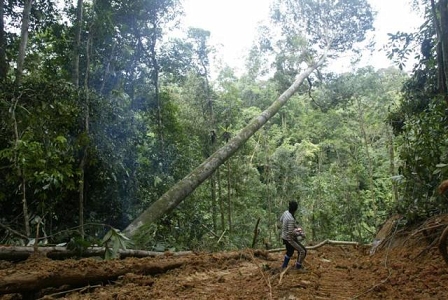Erstellt am: 6. 12. 2010 - 17:28 Uhr
Can you put a price on trees?
In the Kakum National Park in Ghana, on a rope-walk above the rainforest canopy, I learned for the first time just how rich forests can be.
You could hear its wealth of biodiversity in the cacophony of sound and you could see it in the dozen shades of green of its foliage and the colourful birds.
But our quiet-voiced guide, Kwame introduced us to the forest as a steadily growing pharmacy store. He described how the bark of the Kantun tree we were looking at helped for pregnancy, how leaves could relieve pain killers and the sap could fight parasitic infections.
What price could you put on something like this? But this is a giant open-air museum. 90% of impoverished Ghana's rainforest has been cleared - much it for agriculture on poor soil and a mining industry
chris cummins
It's an absurd human obsession to pin price-tags on everything, but if economists and conservationist didn't attempt such calculations, dollar-fixated governments would probably continue to destroy forests as worthless.
Take the example of Mozambique, whose timber resources are apparently being chopped down to feed the insatiable demand of the expanding Chinese economy. A 2006 report funded by the U.S. Agency for International Development describes log exporting from Mozambique as an exploitative "gold rush." Vast amounts of raw, unprocessed logs are being taken out of the southern African country and shipped at a low price to China and there are fears that the forest's commercial value could be lost in just a few years.

greenpeace
That's why an agreement to set aside billions of dollars for a scheme called REDD, which stands for "reducing emissions from deforestation and forest degradation", was hailed as the only palpable success recorded in last year’s train-wreck of a climate summit in Copenhagen.
Money might not grow on trees, but without them we'd soon be penniless. REDD is a very ambitious plan to determine a set value for the world’s forests and thereby to ensure their conservation. If it works it could cut 18-20% of global carbon emissions. The idea is that government money or market mechanisms will repay people who conserve the forests and its development is billed as one issue where significant progress could be made at the on-going talks in Cancun. The international community wants something to hold up as progress on the climate negotiation level in order to combat the general feeling that these annual meetings are an expensive waste of time, money and, of course, carbon.

greenpeace
The Maths of Deforestation
To give you a concrete sum, the UN has warned that deforestation is costing the world up to 4.5 trillion dollars annually. There’s obviously a lot of educated guesswork involved in such a valuation, but this is how the maths is done:
Some of that money is lost when once fertile fields turn barren and dusty, as is increasingly happening in South America. The global forests have been called “the Earth’s watering can” since it’s their evapotranspiration that helps regulate the water-cycle. As the Economist concluded in a recent edition: “on hydrological grounds alone, conserving forests is often essential.” Scientists say the destruction of the Amazon rainforest combined with an increasingly irregular water flow due to melting glaciers is causing increasing drought in South America. Authorities in the Andes are turning off taps to the public for lengthening periods of time and conflicts over water supply increasing exponentially.
And, as my Ghanain guide Kwame had hinted, forests have also been called “the Earth’s medical cabinet”. Many of the life-saving drugs we use nowadays originate from chemical compounds discovered in the rainforests. For example, conservationists point to the development of a pair of drugs called Vincristine and Vinblastine, which were found in the rosy periwinkle plant of Madagascar. These drugs have meant survival rates for childhood leukemia alone rose from 10% to 90% over the course of a very few years. But the plant is now extinct in the wild because of deforestation. How many similar potential “wonder drugs” have already been destroyed before we realized their potential, and how many will we continue to destroy? You can only hazard a guess.
Most famously and most obviously, forests have been called “the Earth’s lungs” since they provide us with clean air. It’s estimated that the Amazon rainforests alone contribute 20% of the Earth’s oxygen supply by converting carbon dioxide into oxygen. Every tonne of carbon that far-off rain forests soak up and lock away in trees should be seen as a pot of gold for our oil addicted economies.
And finally (although I can’t think of a pithy moniker for this job) there’s the role they play in binding the soil that prevents erosion and devastating landslides (or avalanches for that matter). Haiti’s uncontrolled deforestation haunts the Caribbean nation in terms of devastating mud-slides every time there are heavy rains.
If you think of all those roles, the 4.5 trillion dollars annually doesn’t seem such an unrealistic guess after all.

greenpeace
Steve Bass of the International Institute for Environment and Development told me recently that “we’ve got to make sure that this resource base is properly maintained.” He complains that poor people are being ripped off by a combination of the incompetence of their own governments whose accounting systems “don’t even look at the wealth they are using or abusing” – and by cynical logging and construction companies that “are literally pulling the natural resources wealth from under the feet of poor people”.
This is why, if it works, REDD is so vital. Leaders in the developing world will have an incentive to keep their forests, and it is an incentive that they can sell to their voting public. The scheme might work like this: governments, polluting companies and investors in rich nations would buy REDD credits from projects that preserve and protect large areas of tropical forest. In return, the credits would be used to offset a portion of the greenhouse gas emissions in rich nations.
Teething Problems
But the scheme is already showing signs of corruption. So far it has been implemented on a very small scale trial basis in countries like Papua New Guinea and Indonesia and in almost every case it has been bedeviled by corruption. If this corruption isn’t kept under control, vast sums of money will be wasted when the scheme is scaled up to a potential 30 billion dollars a year. But in several rainforest nations, including the Democratic Republic of Congo and Equatorial Guinea, corruption is endemic. While there have been promises to place robust anti-corruption measures ahead of any donations, deeply engrained corruption isn’t solved overnight. And the battle against climate change doesn’t have enough time on its hands to be patient.
Meanwhile the group Friends of the Earth International revealed a report on the first day of the Cancun summit claiming that some of the world's largest oil mining, car and gas corporations will make hundreds of millions of dollars from the REDD scheme. They called it the potential “privatization of the forest”.
The report says the scheme could potentially transfer the forests “out of the hands of indigenous peoples and local communities and into the hands of bankers and carbon traders.” Friends of the Earth say that indigenous rights must be properly addressed if the scheme isn’t going to have negative implications for the people whom natural resources expert Arun Agrawal has called “the real forest stakeholders.” Bolivia has been particularly opposed to any market-based scheme that might “commoditise forests” and many expect President Evo Morales to turn up at Cancun and give vent to his scepticism.
Corruption, false accounting, commercial bullying – these are big issues to address and yet there is no sign that will dealt with any seriousness at Cancun. Only informal discussions about REDD are taking place and (forestless) Saudi Arabia is apparently hostile to the whole idea. World leaders have given themselves the deadline of 2013 to hammer out a final deal on an effective REDD scheme – once again with climate change issues, the clock is ticking.


